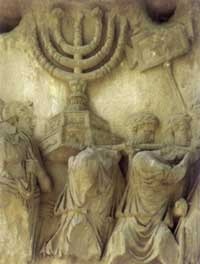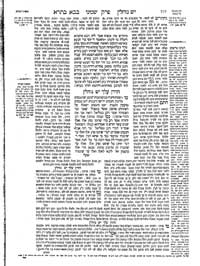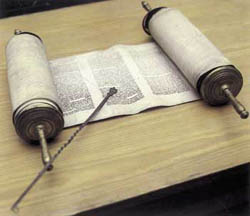





Roman soldiers are taking away Menorah, seven branched candelabrum, and other loots from the Jerusalem Temple. Rabbis from Yemen. After the destroying of the Jerusalem Temple in 70 C.E., Judaism lost its major religious centre. The teaching and religious leadership were placed in rabbis' hands, who study and interprete Scriptures and explain religious rules of law. They also act as judges.
Pesach festival. It is one of the oldest and the most important of the Jewish festivals. It commemorates the Exodus and liberation from the slavery in ancient Egypt. It is celebrated in spring and symbolically announces the redemption of the world after the coming of the Messiah. The celebration begins with the special dinner called Seder [Hebr. "order"], subject to the very strict rules. Then the Haggadah (collection of prayers, blessings and stories about Izraelites' life in slavery in Egypt) is being read and the events it tells about are being symbolically commemorated. For instance, to commemorate hard conditions the Israelites had to cope with during 40 years of their wandering in the desert, one eats matzo (unleavened "bread"). Many of the Jewish festivals commemorate various biblical events. |

Page from the Babylonian Talmud. Talmud [Hebr. "teaching"] is the second (after the Bible) most important scripture of Judaism. It consists of commentaries on the Bible, rabbinic discussions, principles covering every sphere of life, moral directions and parables. It was developed gradually and its central parts were compiled during the 4th century C.E. in the Babylonian Talmudic Academies. Talmud, that numbers 5894 pages, consists of two parts: Mishna (oral law) and Gemara (commentaries and analysis of Mishna). Talmud is the most important work of the Jewish teaching. Studying Torah and Talmud is an obligation for every pious Jew.
A boy during Bar mitzvah [Hebr. "son of the commandment"]. The Jewish boys celebrate Bar mitzvah at the age of 13 (girls at the age of 12 lat celebrate Bat mitzvah). It is a symbolic moment of achieving by the Jewish juvenile full rights as member of the religious community. From that moment on he or she is subject to all the commandments and is fully responsible for all his or her deeds. During the Bar mitzvah celebration boys are called to read the fragment of Torah for the first time and to comment on it. In the 19th century similar ceremonies were introduced for girls as well. Since the biblical times Jewish boys have been taught reading and writing. In diaspora the Jews were in most cases the only social group having this ability as a whole. |

Torah scroll. Torah [Hebr. law, teaching] the first five books of the Bible (Five Books of Moses or Pentateuch); common central part of the Hebrew biblical canon and Christian Old Testament. For the Jews it is the most sacred object of reverence. Torah must be handwritten. Every week one of its fragments is beeing solemnly read in the synagogue. In the 13th century B.C.E. the Jews inhabited cities and villages in what is today's Israel, and Jerusalem, with its Temple, was the major city in that territory. Their religion, Judaism, preached that there was only one God, demanded ethical conduct from the faithful and propagated collective praying.
After the Jewish uprisings against the Roman occupation (66 - 135 c.e.) the Jews had to leave Jerusalem and Judea. The period of diaspora - two millenia of dispersion - began. When living in diaspora, they organized themselves into communes subject to special regulations and limitations. After having achieved full civil rights they began to integrate with the societies they had lived within for centuries. Being a Jew gained its secular and national dimension. At the end of the 19th century there appeared Zionism - Jewish national movement - propagating the idea of return to Palestine and restoration of the state of Israel. After the tragedy of Holocaust, the idea of common history and fate became particularly significant. Its weight increased when - in 1948 - the independent state of Israel was called into existence. Although 2,5 millon of the Jews "returned" to Israel within following years, the most of them still live in diaspora.
David Ben-Gurion [born as David Grn] leader of the Zionist movement, the first prime minister of Israel; born in 1886 in Płońsk, Poland, then part of the Russian Empire. He joined the Zionist movement at its early stage. In 1906 he settled in Palestine. After the United Nations had divided Palestine in 1947, he proclaimed the rise of Israel on the 14th May 1948. He died in 1973. |